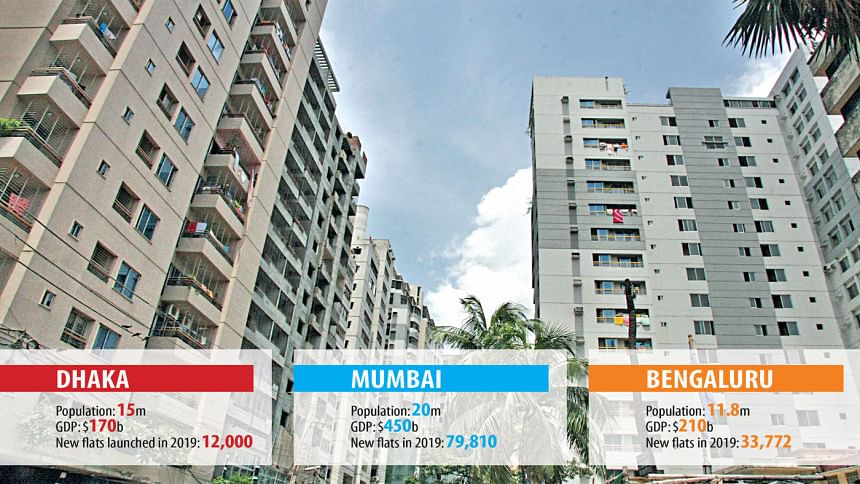Making home ownership viable

Home ownership is an instinctive human need but will remain a cherished dream for most Bangladeshis as aspirations alone are not enough to sell houses.
Home ownership and similar investments in real estate need to be a viable economic proposition.
A pragmatic government policy is needed to ensure a robust housing sector for the country that will in turn, help materialise the dream to own a home for as many people as possible.
In 2019, the Real Estate and Housing Association of Bangladesh (REHAB) began various new projects that, once complete, would provide 12,000 apartments for general use in Dhaka.
However, for a city with roughly 15 million inhabitants and a GDP of $170 billion, a meagre 12,000 units being launched in a calendar year are pitiful.
Compare this statistic to Mumbai, which has a population of 20 million and GDP of $450 billion, but saw 79,810 apartments handed over in 2019.
Even Bengaluru, which has a population of 11.8m and GDP of $210 billion, had 33,772 new apartments unveiled in the same period.
I have intentionally not brought into reference the statistics of the more developed countries so that we may compare apples to apples instead of oranges.
After all, India and Bangladesh have a more or less similar nominal per capita GDP and are ranked closely in the Human Development Index (HDI).
I am incredibly proud of the progress Bangladesh has made in almost all sectors amid the last two terms of the present government.
Our economic fundamentals have a sound footing. The GDP growth, foreign exchange reserves, debt as a percentage of GDP have all been very strong but this is all the more reason to ponder why our real estate industry is performing so poorly.
The real estate industry is generally considered to be the backbone of a nation's economy. The Geneva UN Charter is a non-legally binding document that aims to ensure that member states provide decent, adequate, affordable and healthy housing for all its citizens.
In light of the above, has enough been done for the housing industry of Bangladesh? Our housing sector accounts for 8 per cent of the national GDP. A significant contribution indeed but it is trailing way behind when compared to neighbours India, where it contributes 15 per cent.
The point I am trying to make here is that this is a very important sector which is not being managed properly.
The first thing to understand is that the industry is not benefitted by desperate price cuts from developers. In a highly competitive market like ours, where developers work with paper thin margins, discounts and price cuts can only be accommodated by cutting corners.
Price reduction also harms those who have already purchased their homes at previously higher prices. This creates negativity among investors and the outcome is a downward spiral due to a lack of confidence in the market.
The end result is lower economic activity which also affects the country's GDP growth due to a lesser number of new projects being launched and home ownership remaining a distant dream for the masses.
It is paradoxical that when apartment prices start rising, the sales volume also increases. This proves that the market is very much sentiment driven.
Buyers fall into two broad categories. The aspiring home owner and the prospective investor. Let me analyse the situation from both perspectives.
There are many self-proclaimed experts who constantly criticise developers for only building homesteads for the wealthy. What they fail to comprehend is that the developer will build only where there is a demand.
It is up to the government to make policies that creates demand from any particular socio economic group. Looking at it from a middle-income person's perspective, owning an apartment in metropolitan Dhaka is beyond affordability.
The average middle-income person spends about 30 to 40 per cent of his monthly salary on rent. He can only afford to pay the same amount towards his monthly EMI if he is to buy an apartment.
Assuming that he wishes to own an apartment of similar standards to the one he presently rents, he can only borrow up to a maximum of 50 per cent of the value of the new apartment.
The other 50 per cent of the price must be arranged from his own sources as his share of the equity. This is unaffordable for a vast majority of middle-income people and therefore puts to rest their dreams of home ownership.
In countries where a large segment of ordinary people own homes, it is usual to pay only 10 per cent of a property's value as the buyer's equity and the rest in housing loans through EMIs, which would be about the same as the rent the buyer would otherwise be paying.
Of course, this is possible because the economy in those countries is far stronger and hence, the buyer's affordability is higher as well.
We may not be able to bring home ownership within the means of all people but with the right policies, the market could be expanded to make home ownership possible for many more people.
From a prospective investor's viewpoint, buying an apartment in metropolitan Dhaka is not a very attractive proposition either. The ratio of rent to price is very low (between 3 to 4 per cent) whereas the home loan interest is 9 per cent.
This means that if he is to service the debt on the purchase of an apartment from rental income, he has to also put up a very big percentage of the price of the apartment as his share of the equity.
Over the years, unless there is a good appreciation to the value of his apartment, his investment will not be very lucrative. When developers are forced to issue price reductions and discounts on account of a dull market, it affects the investors very badly. Nobody wants to invest in an asset that depreciates.
In response to the assault of covid-19, our Prime Minister showed her sagacity in promptly announcing a stimulus package to support the economy. Soon, there were demands from different trade bodies and associations, seeking fiscal support for their respective sectors.
I will not comment on matters relating to other sectors but I will qualify my views relating to the real estate industry. I am totally against providing any kind of financial support, be it in the form of interest waivers or new loans on low interest rates to inept developers who have run into financial distress on account of their own greed and incompetence.
This will only give a wrong signal that it is okay to be irresponsible and incompetent because you would eventually get bailed out. These are the developers who created havoc in the industry by offering very high rates to landowners and sign innumerable deals without any regard to the financial viability of the projects.
Bailing them out would be harmful to the real estate sector. These shoddy developers also bring untold misery to the unsuspecting buyers who get lured in by fancy advertising and colourful brochures only to find that with any turbulence in the market, the developer has indefinitely delayed the completion of the project, or in some cases, abandoned it completely.
Such malpractice gives the entire industry a bad name and destroys the buyers' confidence.
The objective of the government's policies should be to make the market strong and vibrant. Not to bail out non-performing developers. Policies should be directed at making home ownership affordable and investment in housing to be a financially lucrative proposition.
There is an old proverb, 'you can't have your cake and eat it too'. This applies to our policy makers when it comes to housing. Do you want to make it possible for the maximum number of people to own homes and the housing industry to prosper, or do you want to maximize government revenue by imposing direct and indirect taxes that makes home ownership unaffordable? You cannot have it both ways.
The writer is the chairman of bti Holdings Ltd

 For all latest news, follow The Daily Star's Google News channel.
For all latest news, follow The Daily Star's Google News channel. 



Comments